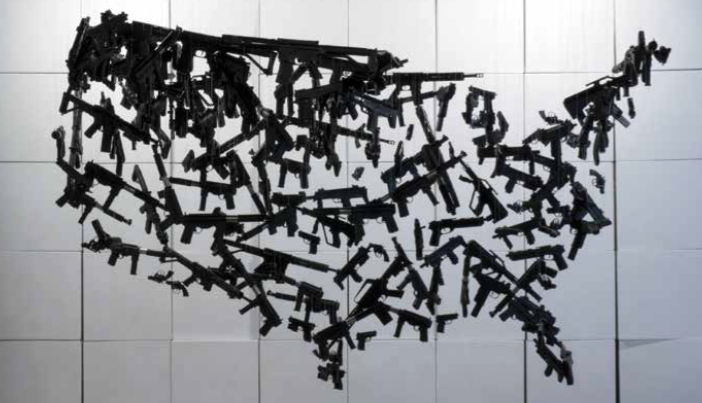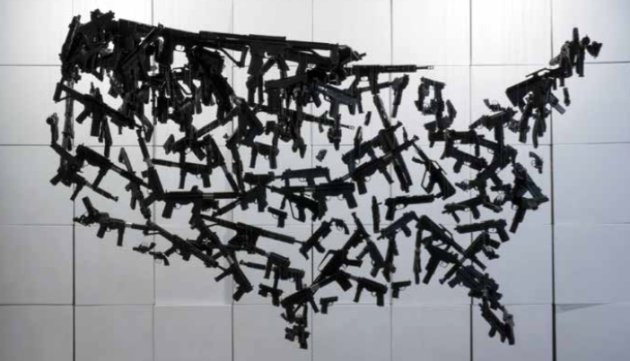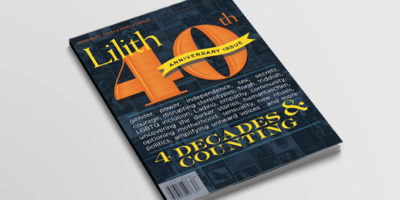
Fall 2016: Teens and Guns
They're looking out for their own safety now.

Art: “Identity Crisis” by Michael Murphy
A few years ago, at a workshop at my suburban East Coast temple, parents were asked to list some of the ways in which they were keeping their older children safe. Many spoke about the need to keep drugs and alcohol out of reach. But one mother had a very different item on her list: She said her son was not allowed to visit a home with guns. The comment did not get much response. Perhaps because in our community vegans are far more common than hunters, most of us did not seem particularly worried about guns.
I forgot about that discussion until this spring when a colleague from another part of the country told me about a shooting in a home where her son had routinely attended Jewish youth group meetings. Her teenage son’s friend had been accidentally shot and killed by his older brother.
That mother speaking up at my temple had a point the rest of us had brushed off: that a gun in a home can be potentially far more dangerous than a bottle of vodka.
On an average day in the U.S., seven people under 19 are killed with guns, according to Everytown for Gun Safety Support Fund, a research and advocacy group. And with a new law allowing concealed handguns on college campuses in the state of Texas, high schoolers have plenty of reason to be worried about a danger they may soon face. While this national issue affects all young people, not just Jews, it has captured the attention of at least one Jewish youth organization, whose teen leaders see it as a safety concern at their own events and as a moral imperative as Jews to protect lives. The organization, the North American Federation of Temple Youth (NFTY), is now speaking out in local communities, and, in a noteworthy move, has created gun-safety policies for parent-hosted events in private homes.
The momentum for these measures came from the teens themselves in the wake of the rise in reported gun deaths, especially the ones at Sandy Hook Elementary School four years ago, said Beth Rodin, NFTY managing director. Since then, NFTY’s high-school-aged teens have felt “very compelled” to take action, immersing themselves in gun safety education and advocacy. One especially poignant example demonstrated that gun peril is not limited by state or culture. When each of NFTY’s 19 regions planned to host a memorial service for victims of school shootings, every single region found victims to memorialize within their own areas, Rodin said, adding, “It’s terrifying.”
In February, NFTY’s leaders passed a lengthy resolution affirming their organization’s commitment to addressing gun violence. Among the statistics cited in the resolution: More than one in five teens aged 14 to 17 in the United States report having witnessed a shooting, and in the three years following the shooting at Sandy Hook Elementary there were at least 94 school shootings. This tally is particularly alarming because while kids can opt out of social events they or their parents deem unsafe, school attendance is not optional.
One of the signers on that resolution was Taylor Gleeson. She’s a NFTY officer who, in a February speech in Washington, D.C., recalled the mass shooting at a movie theater in her home state of Colorado that killed 12 and wounded 70. These acts, she said, “have become the new normal in our country.” She called on NFTY members to “utilize social media to create positive change, deliver sermons and divrei Torah (Torah commentaries) in their synagogues.”
On gun safety, NFTY appears to be the most active of the Jewish youth organizations. A spokesperson for B’nai B’rith Youth Organization (BBYO) declined to comment on the issue to Lilith. United Synagogue Youth (USY) of the Conservative movement has taken positions against gun violence, and worked with the National Coalition Against Gun Violence, but does not have any policies addressing the issue, according to Rabbi David Levy, senior director of teen learning at United Synagogue of Conservative Judaism, which runs usy. “We are committed to ensuring USY remains a safe, caring community and will create new policies as needed,” he said in an email.
On June 2, NFTY’s teens participated in Gun Violence Awareness Day. They joined gun safety advocates all over the country in wearing orange—the color hunters wear for safety—and met with local officials in a dozen cities to lobby for the use of smart gun technology, which would require an authorized fingerprint, or other features, to unlock a gun. Some of those efforts were in partnership with the Religious Action Center of Reform Judaism, and with a campaign called Do Not Stand Idly By, run by the Metro Industrial Areas Foundation, an interfaith civic group. One of the leaders of that campaign is Rabbi Joel Mosbacher of Temple Shaaray Tefila in New York, whose father was killed in a shooting in 1999. The name of Mosbacher’s campaign comes from the well-known passage from the biblical book of Leviticus. “Our efforts are really grounded in Jewish values,” Beth Rodin said. “We’re commanded as Jews to care about this.”
The efforts go beyond pressing legislators. Closer to home, NFTY leaders decided a few years ago to examine their own safety procedures for teen events and meetings. As a result of that review, they revised their permission forms for young people attending these events, and for parents who are hosting. Forms already insisted that drugs and alcohol be under lock and key, and for cars to have the necessary number of seatbelts. Teens attending NFTY events must sign a b’rit k’hilah, a code of conduct, which now includes a clause in which the participant pledges not to bring a weapon or “anything that could be construed as a weapon.”
The parents must now also agree that any firearms in the home will be safely locked away. The teens may know better than their elders on this, it seems. Some parents have called to ask what exactly “locked away” means, Rodin said. And at least one family scheduled to host a youth group refused to sign the agreement to protect their guests from the guns in their house. Thanks to the new vigilance, and the new form, they were not permitted to host.
Heidi Gralla, a freelance journalist, lives in Hastings-on-Hudson, NY, with her husband and three children.


